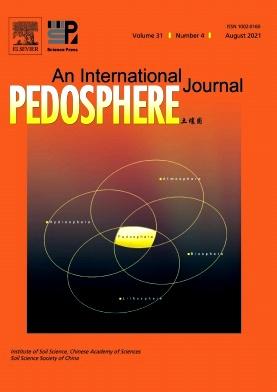Biochars improve agricultural production: The evidence base is limited
IF 7.3
2区 农林科学
Q1 SOIL SCIENCE
引用次数: 0
Abstract
Biochar application to soil is commonly recognized to improve soil fertility and consequently biomass and food production sustainably. We re-examined the robustness of the underlying data and found that, of the 12 000+ publications on “biochar and agriculture” used in meta-studies, only 109 Institute for Scientific Information (ISI) papers (or 0.9%) provide experimental data on the impacts on crop yield and/or biomass production. Our analysis revealed that none (0%) of these studies compared a biochar treatment to a treatment adding to the soil the same amounts of easily accessible nutrients as found in biochar, 0.9% evaluated the toxicity of biochar, and 5.5% considered at least two cropping cycles after a single biochar application, which in all cases are major shortcomings. Finally, when computed only for agricultural soils (n = 65), the mean biomass or grain yield gain, which was 16.1% (median at 7.1%) for all available experiments, decreased to -0.64% (median at 5.2%). Consequently, the underlying evidence base to support biochar application in agricultural soils to enhance biomass production and grain yield is so far limited.},
生物碳可提高农业产量:证据基础有限
人们普遍认为,在土壤中施用生物炭可以提高土壤肥力,从而可持续地提高生物量和粮食生产。我们重新检查了基础数据的稳稳性,发现在元研究中使用的1.2万多篇关于“生物炭和农业”的论文中,只有109篇科学信息研究所(ISI)的论文(占0.9%)提供了对作物产量和/或生物质生产影响的实验数据。我们的分析显示,这些研究中没有(0%)将生物炭处理与向土壤中添加与生物炭中发现的相同数量的易于获取的养分的处理进行比较,0.9%评估了生物炭的毒性,5.5%考虑了一次生物炭施用后至少两个种植周期,这些都是主要缺点。最后,当仅计算农业土壤(n = 65)时,所有可用实验的平均生物量或粮食产量增益为16.1%(中位数为7.1%),降至-0.64%(中位数为5.2%)。因此,迄今为止,支持在农业土壤中应用生物炭以提高生物量生产和粮食产量的潜在证据基础有限。
本文章由计算机程序翻译,如有差异,请以英文原文为准。
求助全文
约1分钟内获得全文
求助全文
来源期刊

Pedosphere
环境科学-土壤科学
CiteScore
11.70
自引率
1.80%
发文量
147
审稿时长
5.0 months
期刊介绍:
PEDOSPHERE—a peer-reviewed international journal published bimonthly in English—welcomes submissions from scientists around the world under a broad scope of topics relevant to timely, high quality original research findings, especially up-to-date achievements and advances in the entire field of soil science studies dealing with environmental science, ecology, agriculture, bioscience, geoscience, forestry, etc. It publishes mainly original research articles as well as some reviews, mini reviews, short communications and special issues.
 求助内容:
求助内容: 应助结果提醒方式:
应助结果提醒方式:


